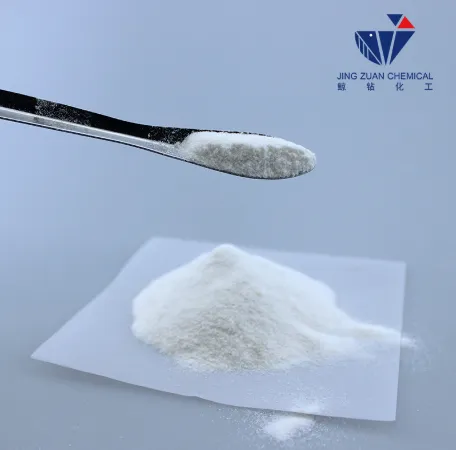
ફેબ્રુવારી . 21, 2025 16:01 યાદી પર પાછા
HPMC Powder: Versatile and Stable Across pH Ranges
Hydroxypropyl Methylcellulose (HPMC) powder is a multifunctional ingredient commonly used in a wide variety of applications, from pharmaceuticals to cosmetics and construction materials. One of the standout properties of HPMC powder is its remarkable stability across a broad pH range (typically 3 to 11). This means it maintains its solubility and functional properties even in different acidic and alkaline environments, making it ideal for diverse formulations.

Whether you are formulating a cosmetic cream, medication, or building materials like mortars and adhesives, HPMC powder provides reliable performance by ensuring consistent viscosity and stability throughout the product lifecycle. Its ability to withstand varying pH conditions makes it an essential component in creating high-performance products that meet the needs of different industries.
HPMC Solubility in Water: The Key to Easy Mixing
When it comes to HPMC, one of its most remarkable features is its solubility in water, which plays a crucial role in many formulations. HPMC dissolves easily in both cold and hot water, allowing it to be quickly incorporated into various products like adhesives, paints, and pharmaceutical suspensions. The water-soluble nature of HPMC allows manufacturers to create smooth, uniform solutions with ease.
This solubility is essential in applications where precise viscosity control is required. Whether you are using HPMC to create a tile adhesive, mortar, or a pharmaceutical gel, its ability to form a clear, viscous solution in water makes it a go-to ingredient in formulations that demand ease of application, stability, and consistency.
Because HPMC maintains its solubility in water across various temperatures, it can be used in a wide range of industries, from cosmetics to construction, without the need for specialized handling or preparation. This feature also helps ensure uniformity in the final product, reducing the chances of uneven texture or clumping.
HPMC Solubility in Ethanol: Limited but Useful
While HPMC is highly soluble in water, its solubility in ethanol is much more limited. HPMC doesn’t dissolve as effectively in ethanol as it does in water, which can affect its behavior in formulations that rely on ethanol as a solvent. However, in certain applications where both water and ethanol are used in a blend, HPMC can still perform well, provided the ethanol content is kept at a moderate level.
This characteristic is important in the pharmaceutical and cosmetic industries, where formulations often require a combination of solvents for specific effects. For instance, in cosmetic formulations such as lotions and creams, HPMC can work effectively in emulsions that include both water and alcohol. However, in applications that rely solely on ethanol as the solvent, alternatives may be needed.
HPMC Side Effects: Safety and Considerations
One of the reasons HPMC is so popular in a wide range of products is its safety profile. Generally considered non-toxic and safe for use, HPMC is used in many pharmaceutical and cosmetic products without significant adverse effects. HPMC side effects are rare, but like any substance, it’s important to use it according to recommended guidelines.
In pharmaceutical applications, HPMC is used as a binder, stabilizer, and thickening agent without causing irritation or harm to the skin or mucous membranes. Its non-toxic nature and biocompatibility with human tissues make it a popular choice for tablet coatings and other drug formulations.
However, excessive use or improper handling may cause digestive discomfort or irritation for sensitive individuals, particularly in oral dosage forms. If you're incorporating HPMC into a product, it’s important to test for any side effects or interactions, especially if the formulation contains other active ingredients that could potentially cause reactions.
Temperature and pH Stability: Consistent Performance in Varied Conditions
A major advantage of HPMC is its stability across a wide pH range, typically from 3 to 11. This allows it to perform consistently in a variety of formulations, regardless of whether the formulation is acidic or alkaline. Whether you're dealing with low pH (acidic) environments in cosmetic gels or the more alkaline conditions often found in construction materials like cement and mortar, HPMC will maintain its functionality, improving adhesion, viscosity, and water retention.
Its temperature stability further enhances its appeal in formulations where temperature variations might otherwise affect performance. This makes HPMC suitable for applications that require consistency across a broad range of environmental conditions. Whether in cold or hot water, HPMC maintains its solubility and overall performance, ensuring that your product remains stable and functional.
Conclusion: The Reliable and Flexible Polymer
In conclusion, HPMC is a versatile and stable polymer that serves a wide range of industries by offering solubility in water, excellent performance across varied pH ranges, and a safe application profile. From construction to cosmetics and pharmaceuticals, HPMC plays a critical role in ensuring product consistency, quality, and performance.
If you're looking for a reliable, cost-effective solution for your formulations, HPMC offers unparalleled flexibility and efficiency. With its proven safety record and ability to maintain its performance in various conditions, HPMC is a must-have ingredient for a variety of industries. Discover how HPMC can elevate your products today and visit our website to learn more about our high-quality HPMC powders and formulations.
-
Versatile Hpmc Uses in Different Industries
સમાચારJun.19,2025
-
Redispersible Powder's Role in Enhancing Durability of Construction Products
સમાચારJun.19,2025
-
Hydroxyethyl Cellulose Applications Driving Green Industrial Processes
સમાચારJun.19,2025
-
Exploring Different Redispersible Polymer Powder
સમાચારJun.19,2025
-
Choosing the Right Mortar Bonding Agent
સમાચારJun.19,2025
-
Applications and Significance of China Hpmc in Modern Industries
સમાચારJun.19,2025







